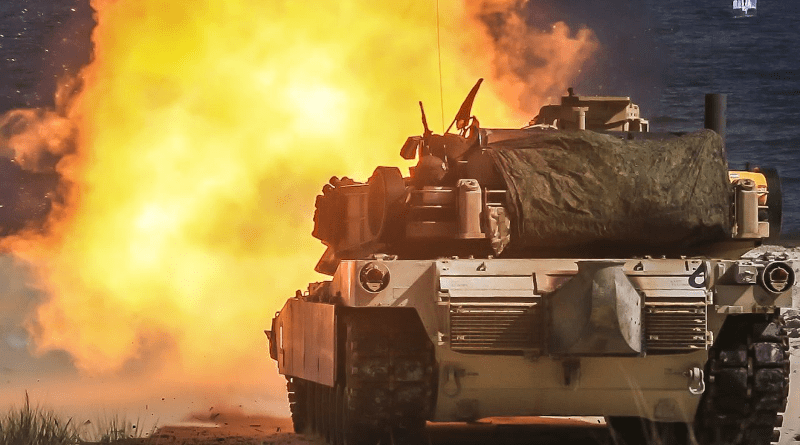US Military Leaders Pledge Support For Ukraine ‘As Long As It Takes’
By VOA
By Carla Babb
The top U.S. military officials meeting Friday in Germany reaffirmed the U.S. and allied commitment to support Ukraine against Russia’s invasion for “as long as it takes.”
U.S. Secretary of Defense Lloyd Austin and U.S. Joint Chiefs of Staff Chairman General Mark Milley spoke to reporters following the 11th meeting of the Ukraine Defense Contact Group (UDCG) at Ramstein Air Base in Germany.
The group is made up of more than 50 nations — NATO members plus at least 20 other nations — dedicated to supporting Ukraine’s defense against Russia’s invasion by providing military equipment and training.
Austin said the UDCG has provided more than $55 billion in security assistance to Ukraine since the group was formed about a year ago, giving the nation tremendous capability, including a variety of missiles, artillery and air defense systems.
Most recently, the UDCG has delivered more than 230 tanks and more than 1,550 armored vehicles, allowing the Ukrainian military to support more than nine new armored brigades.
Austin also confirmed the expedited delivery of 31 U.S.-made advanced M1A1 Abrams tanks. He said the battlefield-ready tanks would be delivered by October, faster than expected. He said versions of the tanks to be used only for training would arrive in the coming weeks.
U.S. defense officials have said the tanks will be sent to a base in Grafenwohr, Germany, so Ukrainians can start a 10-week course on how to operate them. The U.S.-led training will involve about 250 Ukrainians.
Calling himself admittedly “biased,” Milley said he believed the M1A1 tanks were best in the world and would make a difference on the battlefield, though he said, in war, “there is no silver bullet, and the tanks alone will not win the war for Ukraine.”
The thick armor of the Abrams tanks and their 1,500-horsepower turbine engines make them much more advanced than the Soviet-era tanks Ukraine has been using since the war began.
The Biden administration announced in January that it would send a newer version of the Abrams tanks, the M1A2, to Ukraine when they had been procured and built, a process that could take years.
Pentagon press secretary Brigadier General Pat Ryder said in March that the administration pivoted to provide M1A1 Abrams tanks instead to get the tanks “into the hands of the Ukrainians sooner rather than later.”
The U.K. was the first to promise Western-style tanks for Ukraine, sending its Challenger 2 tanks to aid in the fight. After the U.S. Abrams announcement in January, Germany announced it would provide Leopard 2 tanks to Ukraine and allow other allies with German tanks, such as Poland, to do the same.
Austin also said the group heard from the European Union and several nations about efforts to speed up production and delivery of ammunition to Ukraine, in both the short and long term, an indication of their commitment to building Ukraine’s combat power.
He said the UDCG also heard from Ukrainian Defense Minister Oleksii Reznikov about battlefield dynamics and Ukraine’s most urgent needs.
Both officials were asked about providing the latest in fighter jets to Ukraine, something Ukrainian President Volodymyr Zelenskyy has asked for repeatedly.
Milley said the decision to send fighter jets was “a policy question to be made by political leaders.” From a military perspective, though, he said the primary task at hand was to control the airspace, and the fastest, most efficient and cost-effective way to do that is through ground-based air defense systems.
The general said that since the war began, Ukraine has been denying the airspace to Russian planes, forcing them to rely on missile and artillery attacks. He said maintaining all layers of Ukraine’s air defense systems —from high to low altitude, long range to short range — was currently the most critical military task and was the main theme of the group’s discussions Friday.
The U.S. alone has now provided more than $35 billion in security assistance to Ukraine since Russia’s full-scale invasion began in February 2022, which Austin called “an unprovoked and indefensible war of aggression.”
The Ukraine Defense Contact Group has worked better than predicted in terms of maintaining supplies for Ukraine, showing Western resolve to face down Russian aggression and having “Ukraine’s back even without having forces on the battlefield,” said Michael O’Hanlon, a senior fellow at the Brookings Institution.
The U.S. and allies have vowed to support Ukraine in defending its sovereign territory.

